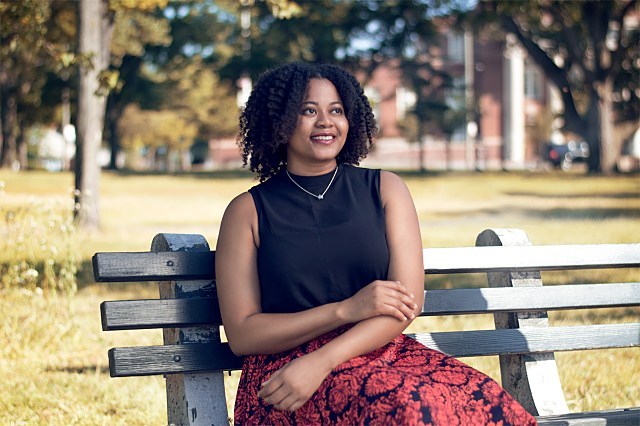Welcome to our special section, Thrive on Campus, devoted to covering the urgent issue of mental health among college and university students from all angles. If you are a college student, we invite you to apply to be an Editor-at-Large, or to simply contribute (please tag your pieces ThriveOnCampus). We welcome faculty, clinicians, and graduates to contribute as well. Read more here.
This interview was originally conducted for and published by The Outpatient Project by virtue of Communications Director Zoe Somerville. Special thanks to her.
1. What was your journey to creating Witted Roots? What inspired you to bring Witted Roots to life?
Witted Roots really has its roots in an interest I’ve always had in helping young women, like myself, navigate life in the best way possible.
The many ideas that I’ve had over the years have changed shaped as I have evolved personally, as well as recognizing what kind of gaps existed in the areas I was interested in.
I studied Psychology at both the undergraduate and postgraduate level, and I always knew in the back of my mind that I wanted to do work in mental health, while incorporating important social aspects to it. Thus, Witted Roots was born, strongly rooted in Jamaica and the Caribbean, while expanded to cover the needs and unique experiences of all millennial women of color.
2. Was there a moment where you knew you were on the right path as you worked to create Witted Roots?
Anyone who has ever attempted to start a business or venture of any kind, especially with limited resources and funding, knows how difficult and disheartening the ongoing process can be. Despite that, I was careful to try to always keep the bigger picture in mind.
There were many occasions where I knew that I was on the right track while creating Witted Roots, but one particular instance stands out:
Early on, when freshly starting to build our social media presence, while working assiduously in the background to build our website, etc., we received a message on our Twitter account. Essentially, it was a young lady that was distressed about a particular situation, and I did my best to defuse how she was feeling about her situation by being present (despite where I was physically at the time), suggesting resources to seek further professional help, as well as just allowing her a safe space to vent her frustrations. While this was an unexpected incident, it really showed me that, while we were nowhere near where we intend to be in terms of being a viable resource for millennial women of color seeking assistance to navigate their mental and emotional health experiences, we were being “seen” and we were well on our way there.
3. Do you think gender impacts the way we approach mental and emotional health? How so?
I studied a double-major in my undergraduate years, Psychology along with Women’s & Gender Studies, and if nothing else, it definitely showed me that gender (stigmas, stereotypes, discrimination, etc.) definitely plays a role in every aspect of how we all navigate life globally.
Intersectionality and multidimensionality cannot be divorced from any experience. It affects both how women were linked to “hysteria” early on, their mental and emotional health experiences observed as a bother to general society. It also affects the global issue of men believing that their masculinity and overall social prowess is threatened by any admittance of a negative mental health experiences (contributing to their lack of seeking professional help, etc.).
Gender plays a part in everything we do, especially in the global society that we live in as it is currently.
4. Do you think race impacts the way we approach mental and emotional health? On top of that, do you think health experiences are different for women of color than for white women?
This is also another aspect of intersectionality and multidimensionality as mentioned before. Race cannot be divorced from any experience we have as we navigate this world. Point blank.
It definitely cannot be separated from how millennial women of color approach mental and emotional wellness, and how these experiences are different than that of women who are a part of the globally dominant race.
As a Jamaican, born and raised, I am very familiar with how a history of racism, imperialism, and neo-colonialism has led to the way that we “traditionally” think of mental and emotional health. There are terms like “cracked in the head” and “mad man/woman” that are rooted in a longstanding lack of education and importance given to the subject. Centuries of our wellbeing not considered a priority, will still continue to have its impact on how we navigate our wellness before.
It’s also important to take note of who has always been the “face” of health and wellness, as well as the opportunities and resources that have always been accessible to them.
5. I see you’re curating a database for mental health professionals in Jamaica, what inspired you to do this?
Much of what inspired the creation of Witted Roots was a vision to overturn the lack of resources and education available to Jamaicans and other citizens of the Caribbean region, by creating our own.
Many do not seek professional help for their mental and emotional health, not just because there is stigma attached to admitting that you need that kind of help in the first place, but also because it is unfortunately very difficult to even know where to go to seek help.
The current resources are seemingly scattered and/or outdated, as well as not particularly accessible, especially for a more tech-savvy generation of people.
By curating a database of mental health professionals, we hope to break down some of the barriers to seeking much-needed help that many have, so far, found it difficult to do.
6. Is there any health-related story you would like to share, or anything you feel we didn’t ask that you wanted to highlight?
At the age of 14, I migrated to the United States and first experienced depression. Of course, I didn’t know that’s what it was at first, and I struggled to navigate a Diaspora that continued much of the shame and stigma surrounding mental health that was common at home. Struggling with this, along with anxiety, for many years, was also an important part of the foundation for what is Witted Roots today and what it will eventually evolve to be: a safe space for millennial women of color to see themselves represented as the primary face(s) within the health and wellness industry (where there continues to be a lack of significant representation), while providing practical resources and actionable strategies to navigating mental and emotional wellness experiences.
More on Mental Health on Campus:
What Campus Mental Health Centers Are Doing to Keep Up With Student Need
If You’re a Student Who’s Struggling With Mental Health, These 7 Tips Will Help
The Hidden Stress of RAs in the Student Mental Health Crisis


